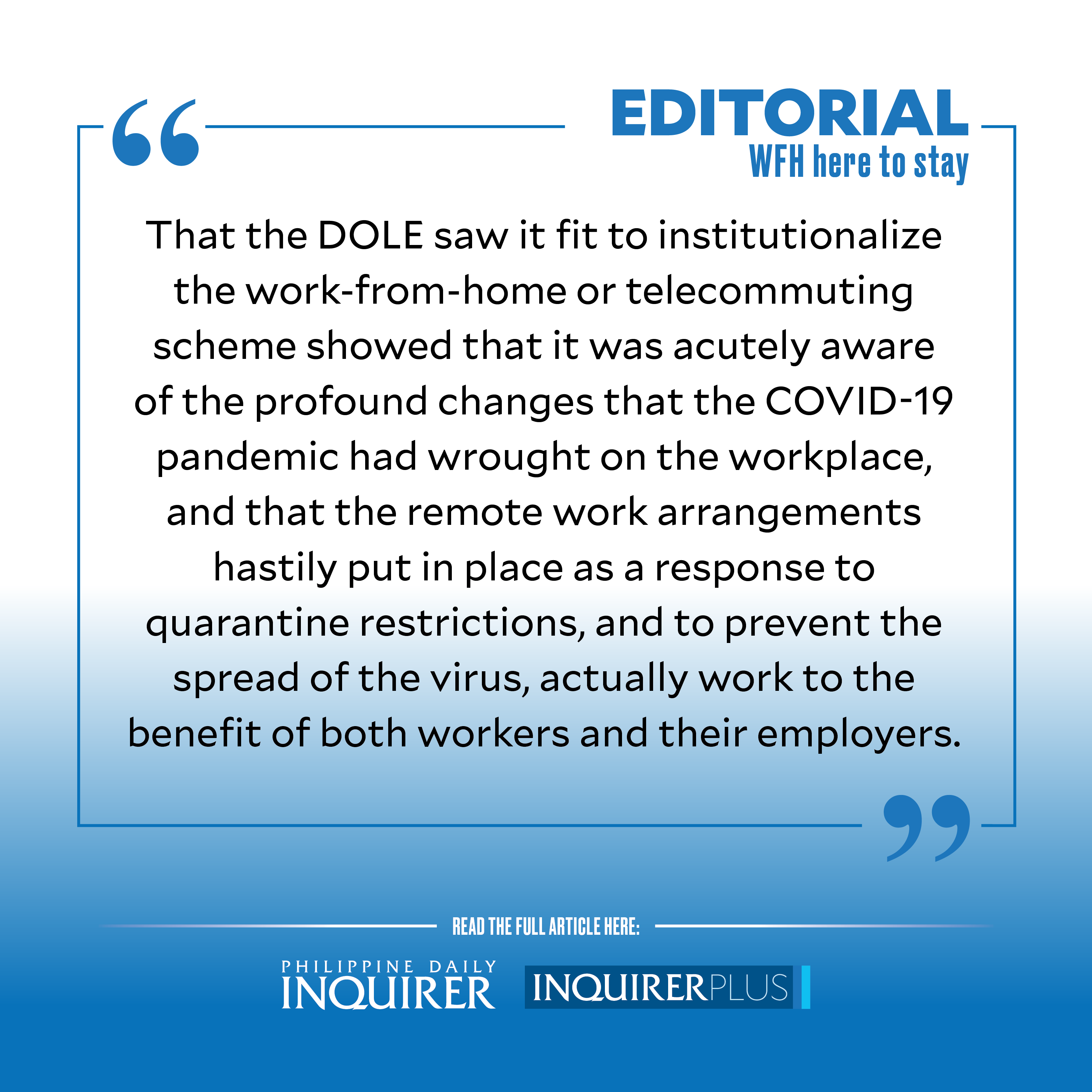WFH here to stay

Employees badly hurting from the unabated increase in the prices of basic commodities got some good news last week when the Department of Labor and Employment (DOLE) issued an order expanding the work-from-home (WFH) scheme, that became more widely adopted as a result of pandemic-related lockdowns.
The revised implementing rules and regulations of Republic Act No. 11165 or the Telecommuting Act encourage employers and workers to craft mutually acceptable telecommuting options, and take full advantage of technological solutions that allow employees to still be productive even when they are working outside their offices.
“The State encourages employers and employees to jointly adopt and implement telecommuting programs that are based on voluntariness and mutual consent, taking into account competencies, available technologies and resources, [and] the nature of the work to be done,” the DOLE order said.
The revised rules were issued following almost two months of consultations with concerned sectors. These also passed the scrutiny of the National Tripartite Industrial Peace Council—a consultative body presided by the labor secretary and composed of labor and employer representatives.
With the DOLE order issued by Labor Secretary Bienvenido Laguesma on Sept. 16, workers are assured that the terms and conditions of telecommuting “shall not in any way diminish or impair the terms or conditions of employment,” and that the work performed in an alternative workplace will be considered work performed in the regular workplace, which means they are entitled to the same rules and policies on holidays or overtime pay.
The new regulations will allow employees, who have seen their purchasing power eroded by accelerating inflation, to save on expenses such as food and transportation fare. More importantly, precious time and energy, otherwise wasted in traffic, can be better spent working anywhere else closer, like home.
That the DOLE saw it fit to institutionalize the work-from-home or telecommuting scheme showed that it was acutely aware of the profound changes that the COVID-19 pandemic had wrought on the workplace, and that the remote work arrangements hastily put in place as a response to quarantine restrictions, and to prevent the spread of the virus, actually work to the benefit of both workers and their employers.
Sen. Grace Poe, who chairs the Senate committee on public services and is an early champion of the WFH and hybrid work setup, pointed out that such schemes saved employees at least four commuting hours daily, and an estimated total savings of P340,000 a year.
Sen. Sherwin Gatchalian, meanwhile, noted that the increased adoption of remote working arrangements would significantly ease the vehicular traffic choking major thoroughfares, especially with the resumption of face-to-face classes and the easing of COVID-19 restrictions, as well as enhance employee productivity because of improved work-life balance. The improved productivity resulting from the WFH setup, the senator said, would make companies more competitive even as they help improve the health of their employees.
It is, indeed, heartening to note that the current administration saw it fit to listen to arguments favoring the WFH or hybrid arrangement with the DOLE order. The order closely followed the earlier decision of the Fiscal Incentives Review Board (FIRB) that allowed all information technology and business process management (IT/BPM) and business process outsourcing (BPO) companies to still enjoy government tax perks while adopting 100 percent the work-from-home setup. It was a good decision that averted the possible flight of BPO companies turned off by an earlier decision to withhold tax perks for those who did not follow the order to return to physical workplaces.
The FIRB decision was resoundingly cheered by this sector that employs some 1.44 million Filipinos. It now expects more IT-BPM companies to invest in the Philippines and create more jobs that bring in badly needed dollar revenues.
“WFH/hybrid work is a game-changer for the Philippines and the sustainability of the IT-BPM industry, and it will be a contributing factor to our ability to create 1.1 million new direct jobs for Filipinos, generate billions more in revenue, and significantly increase our countryside footprint by 2028,” the IT and Business Process Association of the Philippines (IBPAP) said.
IBPAP president Jack Madrid said their members would work even more closely with the government to bring more BPO investments to the country.
All that is left now is for both the government and the private sector to implement these revised rules and regulations as part of official company policy, and allow employees to take advantage of its demonstrated benefits.
As Poe emphasized, hybrid work is clearly here to stay and that employers should “think outside the cubicle” to improve workers’ productivity and health, reduce their expenses, and make the country more competitive. Adopting it is a no-brainer.




















